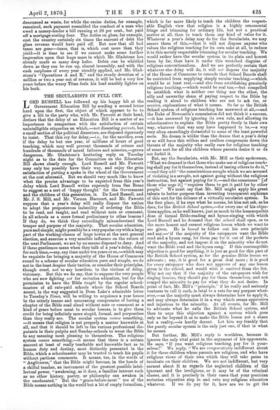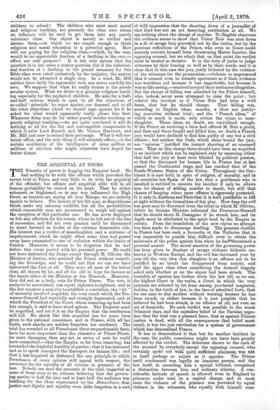THE SECULARISTS IN FULL CRY. L ORD RUSSELL has followed up
his happy hit at the Government Education Bill by sending a second letter hard upon the first, the object of which appears to be to give a lift to the party who, with Mr. Fawcett at their head, declare that the delay of an Education Bill is a matter of no importance in comparison with the satisfaction of certain unintelligible etiquettes on which,—not dissenting parents, but a small section of the political dissenters, are disposed rigorously to insist. That this cry for delay,—i.e., for the sacrifice, even if the delay be but one year, of millions of hours of good teaching, which may well prevent thousands of crimes and hundreds of thousands of moral failures and miseries,—grows dangerous, Mr. Gladstone's hesitating reply on Tuesday night as to the date for the Committee on the Education Bill shows clearly enough. Lord Russell and Mr. Fawcett may only too possibly have their way, and enjoy the grim satisfaction of putting a spoke in the wheel of the Government at the cost aforesaid. But we should very much like to know what the precise advantage to be expected from this year's delay which Lord Russell writes expressly from San Remo to suggest as a sort of 'happy thought' for the Government and the children of this generation, is. Do Lord Russell, and Mr. J. S. Mill, and Mr. Vernon Harcourt, and Mr. Fawcett suppose that a year's delay will really dispose the nation to adopt the preposterous imbecility of ordering the Bible to be read, not taught, and read without note or comment, in all schools as a mere formal preliminary to other lessons ? If they do, we think they exceedingly misunderstand the temper and purpose of the majority. That secular education, pure and simple, might possibly be a very popular cry with a large part of the working-classes of large towns at the next general election, and exercise a very sensible influence on the return of the next Parliament, we are by no means disposed to deny. And if these gentlemen mean when they talk of a year's delay, delay for such time,—say, any time under ten years or so,—which may be requisite for bringing a majority of the House of Commons round to a scheme of secular education pure and simple, we do not in the least despise their tactics, or consider their principles, though cruel, not to say heartless, to the victims of delay, visionary. But this we do say, that to suppose the very people who are now fighting not for sectarian education, but for the permission to have the Bible taught by the regular school- masters of all rate-paid schools where the School Boards assent, in the way suggested in Dean Lake's admirable letter to Tuesday's Times, will be willing to acquiesce a year hence in the utterly insane and unmeaning compromise of having a chapter of the Bible read aloud without note or comment as a kind of grace before meat to secular lessons, is to give them credit for being infinitely more stupid, formal, and purposeless than they really are. The secular system means something, —it means that religion is not properly a matter knowable at all, and that it should be left to the various professional dis- putants in their pulpits and Sunday-schools to wrest the Bible to any meaning most pleasing to themselves. The religious system means something,—it means that there is a certain amount at least of really teachable and knowable fact as to human duty and destiny, most distinctly presented in the Bible, which a schoolmaster may be trusted to teach his pupils without partizan comments. It means, too, in the words of " Anglicanus," that the Bible might become, in the hands of a skilful teacher, an instrument of the greatest possible intel- lectual power, "awakening, as it does, a familiar interest such as no other history, poetry, or philosophy can awaken in the uneducated." But the "grace-before-meat " use of the Bible means nothing in the world but a bit of empty formalism, which is far more likely to teach the children the respect- able English view that religion is a highly ornamental fringe and trimming for ordinary life, but not a practical matter at all, than to teach them any kind of value for it. Whatever a year's delay may do for the Secularists, we may assure them of this,—that it will not dispose anyone who values the religious teaching for its own sake at all, to reduce it to this merely respectable trimming for secular teaching. We would rather have the secular system in its plain and honest form by far, than have it under this wretched disguise of religious conventionalism. And we are perfectly certain that whatever else delay will do, it will not dispose the majority of the House of Commons to concede that School Boards shall be restricted from supplying simply secular teaching,—which would be at least real,—and also from establishing genuinely religious teaching,—which would be real too,—but compelled to establish what is neither one thing nor the other, the silly and unworthy sham of paying respect to the Bible by reading it aloud to children who are not to ask for, or receive, explanations of what it means. So far as the British School system of religious teaching has answered at all,—and the Duke of Newcastle's commission did not think it a success, —it has answered by ignoring its own rule, and allowing its schoolmasters to explain the Bible pretty freely in their own way, whatever that way may have happened to be,—a way very often exceedingly distasteful to some of the least powerful sects. No dream is wilder than the dream that a year's delay or so will force this witless and soulless compromise down the throats of the majority who really care for religious teaching of some sort for all the children whose parents desire it or do not forbid it.
But, say the Secularists, with Mr. Mill as their spokesman, "What we demand is that those who make use of religious teach- ing shall pay for it themselves, instead of taxing others to do it," —and they add "the conscientious scruple which we are accused of violating is a scruple, not against going without the religious instruction, but against paying for it,—and the conscience" [of those who urge it] "requires them to get it paid for by other people." We must say that Mr. Mill might apply his great talents to better purpose than inventing transparent sophisms of this sort for the defence of a virtually secularist system. In the first place, if he says what he means, let him not ask, as he does, for the British School system,—f or every one of his objec- tions applies, as he well knows, just as much to the homoeopathic dose of formal Bible-reading and hymn-singing with which Lord Russell and he demand that the school shall open, as to the more honest and earnest religious lesson which we want to see given. He is bound to follow out his own principle and say,—' if the majority of the ratepayers want the Bible read and a hymn sung, let them pay for it out of the pockets of the majority, and not impose it on the minority who do not want the Bible read and the hymn sung.' If this contemptible objection is good for anything, it is just as good for this part of the British School system, as for the genuine Bible lesson we advocate ; nay, it is good for a great deal more ; it is good for every ratepayer who does not approve of any one lesson given in the school, and would wish it omitted from the list. Why not say that if the majority of the ratepayers wish for singing lessons, they should pay for them themselves, and not compel the minority to pay for what they do not desire. In point of fact, Mr. Mill's "principle," if he really and seriously ventures to call it such, is fatal to a rate for any purpose what- ever,—as the majority must always determine how to apply it, and may always determine it in a way which seems oppressive and injurious to the minority. At all events, for Mr. Mill to advocate what he calls the British School system, and then to urge this objection against a system which goes only so far beyond it as to make the Bible lesson not a sham but a reality,—is hardly decent. Let him say frankly that the purely secular system is the only just one, if that is what he means.
But further, Mr. Mill's reply is worthless, because it ignores the only vital point in the argument of his opponents. He says, " If you want religious teaching, pay for it your- selves I" We reply, " We are comparatively indifferent about it for those children whose parents are religious, and who have religious views of their own which they will take pains to inculcate on their children. We are not indifferent, but very earnest about it as regards the neglected children of the ignorant and the irreligious, or it may be of the criminal classes, and it is precisely in their cases that your precisian sectarian etiquettes step in and veto any religious education whatever. If we do pay for it, how are we to get the children to school ? The children who most need moral and religious teaching, are precisely the class over whom no influence will be used to get them into any purely voluntary class. Our object is merely to civilize and elevate them,—in which we are simple enough to think religious and moral education is a powerful agent. How will our paying for the religions class,—which, by the way, would be no appreciable fraction of a farthing in the rate,— effect our only purpose It is not only untrue that the question is in any sense a money question, but if the infinitesi- mal fraction of a farthing in the pound necessary for this Bible class were voted exclusively by the majority, the matter would not be advanced a single step. In a word, Mr. Mill neither faces fairly his opponents' case, nor states candidly his own. We suppose that what he really desires is the purely secular system. What we desire is a genuine religious teach- ing especially for the neglected children. He asks for a half- and-half system which is open to all the objections of so-called principle' he urges against our demand, and to all the other objections which we should urge against his if he asked for what would apparently really please him best. Whatever delay may do for either purely secular teaching, or purely religious teaching,—we are quite convinced it will do nothing at all for the flat and contemptible compromise to which it suits Lord Russell, and Mr. Vernon Harcourt, and Mr. Mill just now to extend their patronage. What it will cer- tainly effect, and the only thing it will certainly effect, is the certain mutilation of the intelligence of some million or millions of children who might otherwise have hoped for better things.



































 Previous page
Previous page